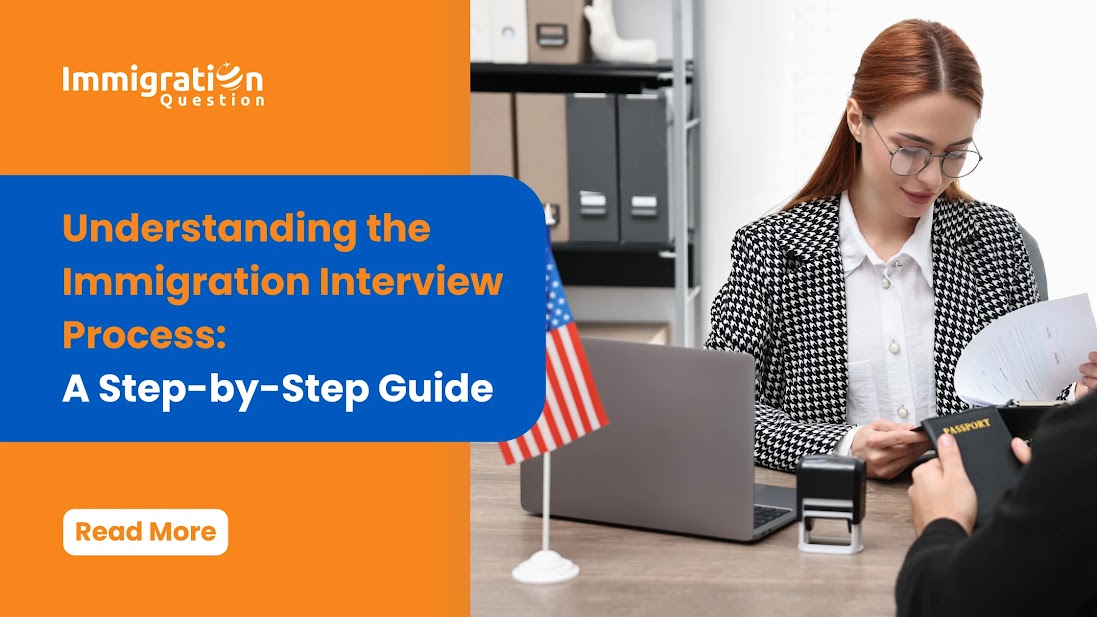For many prospective immigrants, the immigration interview questions asked during the process can be an exciting, yet scary experience. It is one of the most important stages in the immigration process and it can determine whether or not you get to start a new life elsewhere. In this article, we will explain the immigration interview process using a step-by-step guide so that you know how to prepare for it, engage in it and succeed.
Our goal is to provide information that will help you make informed decisions about your application, give you an idea of what to expect during and after the interview, and thus reduce the chances of denial or rejection. If you are applying for a work visa, green card or citizenship, this guide will serve as an ultimate handbook for understanding how interviews with immigration officers are conducted.
Do you require the services of a seasoned immigration attorney? Connect with one at ImmigrationQuestion.com.
Initial Preparation for the Immigration Interview
It is important to prepare for the immigration interview, as preparing can significantly increase your chances of success. Here are some steps to consider taking during the initial preparation stage:
Collecting Required Documents
One of the most important steps in the preparation stage is collecting all the necessary documents which form the basis of your case. These documents should be properly arranged, readily available and within easy reach during the interview.
- Main Identification and Travel Papers: Your valid passport, visa, as well as an interview appointment notice, are paramount. These documents establish who you are and help determine whether or not you are a law-abiding citizen.
- Original Copies of Supporting Documents: You might need to go along with legitimate copies of some documents, depending on your particular situation. Birth certificates, marriage licenses, and divorce decrees (if applicable) can serve as examples in this case. Additionally, if applying based on employment or family sponsorship, financial papers such as tax returns, bank statements or proof of employment may be required.
- Document Organization: Your supporting evidence must be organized logically according to how you submitted it in your application. A binder with labeled tabs will enable you to quickly locate and present these documents during the interview; also carry copies of all documents as the interviewing officer may decide to keep them.
Understanding the Interview Notice
Before the immigration interview process, you typically receive a notice. This letter from the U.S. consulate or USCIS often contains important information about your interview. Therefore, it is important to pay attention and adhere to those instructions.
- Date, Time, and Location: Check the date, time and location of your interview. Be there at least 30 minutes before the scheduled time in order to allow for any security checks and possibly other unforeseen issues. For interviews held at the American consulate outside of America, it is a good idea to get acquainted with local entry requirements.
- Specific Instructions: This notice may contain specific instructions, such as directives to carry extra documents or detailing what you are not allowed to bring into the interview room. It’s always a good idea to consider all of this information so that you can be fully prepared.
- Review Potential Red Flags: The notice might point out areas of concern in your application that could be brought up during the immigration interview process. Ensure you have clear and concise explanations for every issue that may come up.
- Contact Information: If there are any questions that you have relating to the notice, it typically includes contact information for both USCIS and the consulate office/department where your visa was issued. It would be better if you asked questions ahead of time rather than getting stuck upon arrival.
Researching the Interview Process
Knowing what will happen during your immigration interview process can reduce stress levels and enable adequate preparation.
- Acquaint yourself with the Interview Format: There are various formats for different interviews, such as:
- Green Card Interviews: These cases usually involve checking your relationship’s legitimacy (for family-based applications) or genuineness of your work (for employment-based applications).
- Naturalization Interviews: It is important to review U.S. history and government because they ask about this along with a civics test and questions about your application.
- Visa Interviews: These interviews take place at the United States embassies or consulates abroad to determine why you want to travel, how financially stable you are, and if you still have any reasonable ties with your country.
- Research Common Questions: There are many applicants who share their interviewing experiences in online forums, and these can be very helpful. Although each case is unique, common questions often relate to personal history, specifics of your application, and reasons for seeking immigration benefits.
- Stay Informed on Immigration Policies: Any changes made in immigration laws or policies might affect the proceedings of your interview. Be up-to-date with the latest news and procedures so that you won’t be caught off guard.
- Practice with Mock Interviews: Carrying out mock interviews with a friend, family member or an immigration attorney can help prepare responses and reduce stress. During the mock interview, focus on answering questions as honestly and confidently as possible.
Schedule a call with an immigration lawyer to plan your immigration interview on ImmigrationQuestion.com.
Day of the Interview: What to Expect
Arrival and Check-in Procedures
It is good practice to show up ahead of time for your immigration interview. Aim to be there about 30 minutes before it starts, just as a precautionary measure. Upon arrival at the USCIS office or consulate, you’ll have to pass through a security check similar to that in an airport. Carry with you your interview appointment notice, a valid ID card and any necessary documents when you are presenting yourself for inspection by security personnel. Once checked in, sit down in the waiting area as directed until you hear your name called out.
Interview Etiquette and Best Practices
Throughout the interview it is important that you remain calm, polite and understanding. Ideally, you should wear business or business casual attire, which can often convey a sense of seriousness. Always be respectful when responding to questions posed by the interviewing officer. Pay attention to every single question asked and answer them clearly, honestly and concisely. Shake off the need to give out extra information voluntarily; instead concentrate on exactly what you’ve been asked. If there is something you did not understand from the question, do not hesitate to ask the officer to repeat it or clarify. This is an official procedure so keep looking directly into their eyes as well as showing respect while talking to them.
Common Interview Structure and Questions
The typical structure of the immigration interview process begins with an officer looking through the application to ensure you are who you say you are. What comes next is questions. In a marriage-based green card interview, for example, these can be about your relationship history, how you both live together and even joint finance obligations. Naturalization interviews often include queries about one’s background, moral character, and knowledge of U.S. civics. The length of an interview varies between 15 minutes to over an hour depending on how complicated your case is.
After the Interview: Next Steps
Getting The Results of Your Interview
Once your immigration interview is over, the officer will evaluate your case and make a decision to approve, deny, or ask for more information. A decision is usually given on the same day or through mail within a couple of weeks. Keep checking your mailbox and USCIS online account.
Follow Up Actions
You may need to take some extra steps if your application is approved. For instance, you might need to attend an oath ceremony if you’re becoming a U.S. citizen. In some cases, the agent may ask for additional evidence or documents. This is known as a Request for Evidence (RFE). Answer all RFEs promptly in order not to delay your case. When denied, you’ll get details on how to appeal the decision or reapply.
Finalizing Your Status
Once your application is approved and all follow-up actions are completed, you will receive official paperwork verifying your new status. For green card applicants, this means getting the actual green card itself. For citizenship applicants, attending an oath ceremony and receiving a naturalization certificate finalizes your status as a U.S. citizen, etc.
Tips for a Successful Immigration Interview
Practical Preparation Tips
- Gather Necessary Documents: Make sure you have all the necessary documents and they are arranged in an organized manner. This includes identification, employment records, financial statements and other records required by the immigration office. Check the list supplied by the immigration office in order not to miss any important thing.
- Go Over Your Application: Go through your application so that you can become familiar with it. Aim to avoid any inconsistencies between your interview responses and your application.
- Practice Interview Questions: Engage in mock interviews with friends or relatives, as this will enable you to deal with common questions and also increase self-esteem.
- Know The location and time: Decide on your route and come early to prevent last minute problems.
Managing Stress and Anxiety
It is important to manage stress and anxiety when preparing for your immigration interview, as this helps you remain calm throughout the process. Staying well-informed about what happens during an interview reduces worry. Use relaxation techniques like deep breathing, meditation, or yoga to stay relaxed while answering interview questions. Additionally, you can make use of positive visualization when you imagine a successful interview.
Lastly, seek support from people around you like friends, family members or support groups that can inspire hope.
Mistakes To Avoid
Avoiding common mistakes greatly improves your chances of success. Always provide accurate and truthful information. Inaccurate details or discrepancies between your application and interview answers can lead to serious complications. Another common pitfall is lack of preparation; without proper preparation, you may hesitate or make mistakes during the interview.
While answering questions, avoid giving very short responses. You need to find a balance between very short and unnecessarily long answers. Keep your answers in the middle of these two extremes. Deliberate on your responses, ensuring that they are brief but clear so that the interviewer understands your situation fully. Maintaining a positive and respectful demeanor throughout the interview is vital. A negative attitude may give a bad impression as well as influence the outcome of your application negatively.
Conclusion
In summary, the key to a successful immigration interview lies in preparation. How thoroughly have you prepared? Efficient stress management and avoiding common mistakes are two other key elements. To present your best self and perform well during your immigration interview, organize your documents, get familiar with your application, practice potential interview questions, and finally, plan when you will arrive at the office.
Remember to relax by practicing relaxation techniques. Also, ensure that your answers are correct, elaborate and most importantly, try to remain positive throughout the process.
You have the potential to succeed. Concentrate, believe in yourself and take necessary actions as you get ready for the interview. Additional information is available here and here. Take advantage of these resources or get professional advice at ImmigrationQuestion.com to improve your level of preparedness for an excellent performance during the interview.
Frequently Asked Questions
1. What is the purpose of the immigration interview?
The immigration interview process helps assure immigration officials and the USCIS that you were honest in your application. It further helps them determine if you qualify for a green card/citizenship, or any other immigration benefits.
2. How should I prepare for the immigration interview?
Preparing for the immigration interview process typically involves going over your application, collecting all documents, and being ready to answer questions about your personal history, relationships (if any), and future plans in America.
3. What documents should I bring to the immigration interview?
Bring with you your appointment notice, passport, government-issued ID, original records (like birth certificates, marriage certificates), and any documentation supporting your case.
4. What kind of questions will be asked during the interview?
Questions depend largely on case type but may include individual background information, life details like your marriage (in case of a marriage-based green card), or job position (in the case of employment-based visas).
5. What happens after the immigration interview?
The officer can grant approval after interviewing a person, or they may deny your application. If you do not receive a decision at the end of the interview, you will get it in the coming weeks.
About ImmigrationQuestion.com
ImmigrationQuestion.com is a revolutionary platform that connects immigration attorneys to people who have questions. We provide guidance on U.S. visas, citizenship, and green cards, keep you informed with the latest immigration news, and foster a knowledgeable community for support and insights.







